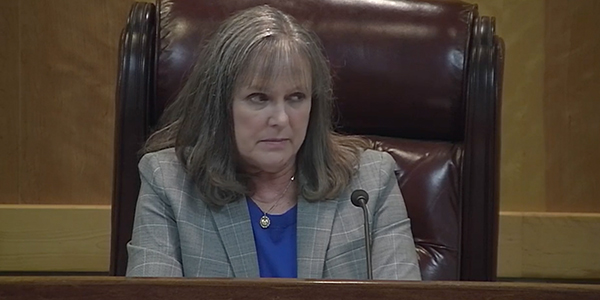Texas regulators last week adopted rules establishing a cybersecurity monitor and coordination program for investor-owned, municipal and cooperative utilities that count on their voluntary participation (49819).
The amendments to the Texas Public Utility Regulatory Act (PURA) don’t require utilities to participate or to submit documents to the monitor. Utilities have made the rules’ voluntary nature a key issue in the proceeding.
But that left members of the Public Utility Commission nonplussed over comments made in the docket. Chair DeAnn Walker said during the commission’s open meeting Thursday that she was “taken aback” and “floored” by some of the stakeholders’ comments “and some of the people making those comments.”
The amendments are the result of two bills approved last year by the state legislature. Senate Bill 64 established the cybersecurity coordination program to share guidance on best practices, while SB 936 set up the cybersecurity monitor.
“Over the years, we have had input from the legislators that they clearly wanted something like this,” Walker said.
Commissioner Arthur D’Andrea said that he too was “taken aback” by the utilities’ comments, noting that the PUC has stood “shoulder-to-shoulder” with its stakeholders during the recent legislative session.
“While [the program is] voluntary, this is not an audit,” he said. “We want to protect their data, but we do expect participation and cooperation.”
When several utilities asked that “voluntary” be added to the rule, the PUC responded by saying the “voluntary nature of participation … is made clear throughout the rule.”
Monitored utilities will contribute to the program through their administrative fee to ERCOT. Those outside the ERCOT footprint will pay for the monitoring under a separate fee.
Any Texas utility “may” participate in the cybersecurity coordination program at no cost.
Commissioners Defend PUC Staff
Walker and D’Andrea both defended commission staff after they felt staff’s comments on an ERCOT Nodal Protocol revision request were devalued in a grid operator stakeholder meeting last week (NPRR1020).
PUC staff filed joint comments with ERCOT staff on NPRR1020, which clarifies that emerging battery storage technologies can be interconnected and operated as a resource. The change proposes to add a definition for “integrated battery storage system” (IBSS) and modifies the definition of “wholesale storage load” (WSL) to include IBSS.
PUC staff did not sign their individual names to their comments, while ERCOT staff did. During the Protocol Revision Subcommittee’s (PRS) meeting Wednesday, at least one stakeholder questioned why PUC staff didn’t sign their names, according to another stakeholder who requested anonymity.
“They wanted a name of a particular staff member. I find that offensive,” said Walker, who relayed her understanding of the PRS meeting based on a phone call she had received from staff.
PUC staff said PURA rules already allow for storage system loads integrated into a single container to be eligible to receive WSL treatment. They said the current IBSS definition “may arbitrarily exclude some integrated battery systems that do not meet all of the criteria specified in the proposed definition.”
“Therefore, [PUC] staff and ERCOT suggest revisions … in an effort to provide clearer guidance and minimize arbitrary treatment in extending WSL treatment to integrated battery systems,” agency representatives wrote. “The definition should focus on the characteristics that support extending WSL treatment to [storage systems] integrated into a single container instead of adding a new technology category to the WSL definition, which already includes the term ‘batteries.’”
“Technology is going to change. We have to be nimble to be able to change and do things with it,” Walker said. “If staff believes [NPRR1020] falls under our current rule, I find it offensive that people at ERCOT are challenging and saying that staff has no rights and has to [identify themselves].”
“Staff’s position is an institutional voice, and that should be good enough,” D’Andrea said. “This [NPRR] is already two-and-a-half years in the making. I’m already embarrassed by how long it’s taken us to nimbly account for this technology. This is the kind of thing Texas should be able to adapt to and that the markets should be able to handle well.”
The Wholesale Market Subcommittee agreed to take up NPRR1020, and ERCOT staff said it would schedule a workshop on the issue. Like the PRS, the WMS reports up to ERCOT’s Technical Advisory Committee.
ERCOT and PRS Chair Martha Henson, with Oncor, both declined to comment.
Customer Protections Extended to June 17
The commission added another month to its pandemic-related provision that suspends customer disconnections for non-payments, from May 15 until June 17, acknowledging concerns that extensions of the emergency order are being issued open meeting by open meeting (50664).
“I was really hoping at this point we would be further along in our reopening of the state,” Walker said, pointing to the Texas Panhandle and the rising numbers of COVID-19 cases related to meatpacking plants. The state reported more than 700 cases on Saturday alone.
“Those customer bills will continue to rack up,” she said. “At some point, they’re going to get a bill they have to pay.”
“I’m concerned we’re just starting to see the effects of economic disruption,” Commissioner Shelly Botkin said.
The order applies to low-income customers of vertically integrated electric utilities that operate outside of ERCOT: Entergy, El Paso Electric, Southwestern Public Service and Southwestern Electric Power Co.
In other actions, the PUC approved an amendment to the PURA that adds retail brokers or aggregators to those governed by customer protection rules for retail service (50406).






